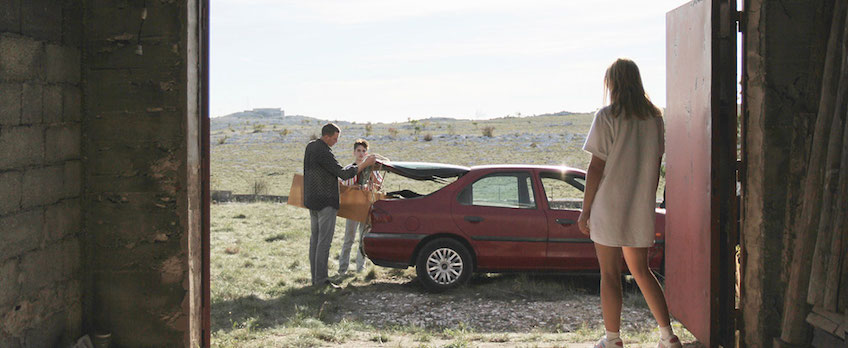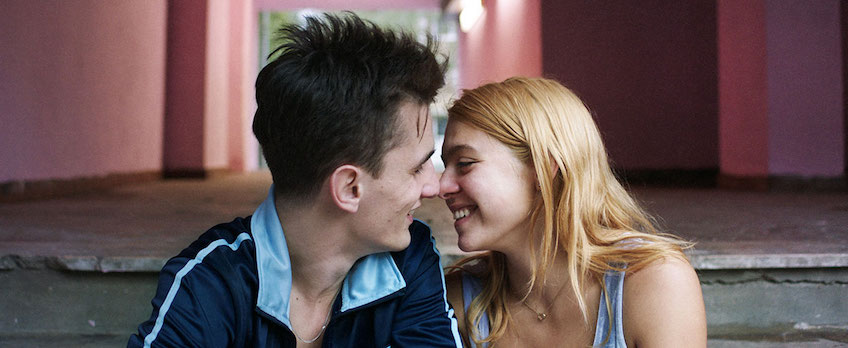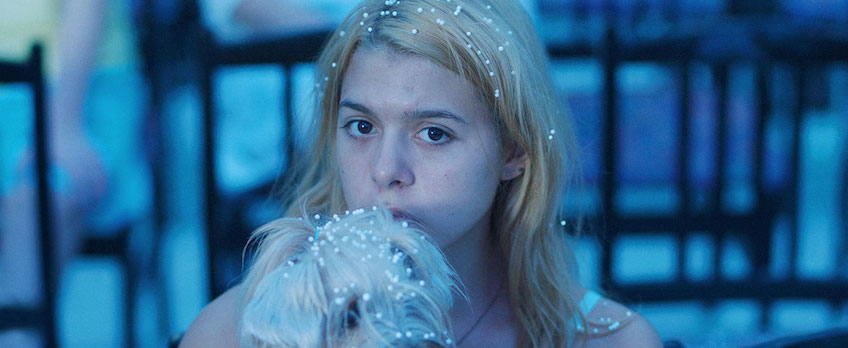Road to Nowhere: Potential and Passivity in Take Me Somewhere Nice

About two-thirds of the way into Take Me Somewhere Nice, all hell breaks loose.
Its trio of adolescent characters takes an unidentified substance found in a stranger’s suitcase and suddenly, their sulky sullenness shatters. It gives way to a satisfying haze of ecstasy and anguish and reckless abandon; the camera becomes bumpy and untethered; the car in which they spend the better part of the film becomes merely a vehicle for burnouts and doughnuts in a gravelly plain at dusk.
It’s a temporary departure in a film otherwise defined by (and at times, victim of) its own regimented stylisation. In this debut feature by Bosnian filmmaker Ena Sendijarević, things feel suspended – in time, in surreal, fairy-floss hues, in Academy-ratio framing that renders the most verdant of landscapes boxy and suffocating. Suspended between choices, too: Take Me Somewhere Nice is the product of a seemingly endless chain of decisions – or lack of decisions – made by Dutch protagonist Alma (Sara Luna Zorić) as she searches for her hospitalised, estranged father by journeying through her native Bosnia, a country she hasn’t visited since childhood. Accompanied by her cousin Emir (Ernad Prnjavorac) and his friend/lackey Denis (Lazar Dragojevic), she picks between dresses in preparation for her trip, between juice flavours at a late-night kiosk, between her travel companions’ loyalties, between The Netherlands’ “cold weather, cold people” (her words!) and Bosnia’s promise of self- and familial discovery.

Sara Luna Zoric and Lazar Dragojevic in a scene from Take Me Somewhere Nice
Some of these choices are consequential, some not. But even the consequential ones become vaguely low-stakes in the wry absurdity of the film’s logic. When Alma is stranded in backwaters after missing a bus ride, she’s helped by an enigmatic – and ephemeral – older woman. When she leaves a nightclub with a lecherous politician, she’s rescued (albeit ungracefully) by Emir and Denis, posing as assailants. The appearance of all three rescuers is something of a deus ex machina, but not in the contrived sense. Instead of hastily tying off the film, it only serves to further problematise the notion of any coherent narrative progression, or character development.
The film is rife with the potentiality of successes and failures but the actualisation of neither. It’s a coming-of-age film that never quite wants to be one. It hits the archetypal notes of a Bildungsroman – burgeoning sexualities, unexpected tragedy, even a movie makeover when she dyes her hair on her first night in Bosnia – but renders them with a casual detachment that truncates their emotional effect on viewers and characters alike. By equating maturity with calculated indifference, Alma mimics the detachment of the film itself, preferring to let situations occur without fully processing their gravitas. She desires change, but is incapacitated by her illusory understanding of it; she performs spontaneity, but is trapped by passivity.
Even the film’s title implies this passivity, its promise of better things, brighter destinations mediated through an external force. Alma isn’t going somewhere nice, but being taken on a premeditated route. She sacrifices her agency in favour of accepting her fate without complaint, an outsider to her own decisions.
All of this makes Take Me Somewhere Nice increasingly difficult to pin down, motivated by a sheer lack of motivation. It exists instead in an uncanny valley governed not by traditional constraints, but by its own aesthetic, absurdist rules. Time gives way to episodic action that fuses day and night into one unending fantasy; spaces become malleable in the hands of Sendijarević, whose vision of a still-young Bosnia is mired in metaphor, bleak by the very nature of the creepy, unflappable optimism of its sun-drenched, pastel sets.
But any political (read: post-war) connotations to be found here are buried deep beneath layers of winking irony. Like most things, the irony in Take Me Somewhere Nice works best when self-aware, and often in the throwaway lines of more hurried moments. “Where are we going?” Denis asks, after an entire film spent convincing Alma to visit the ocean with him. “To the seaside,” she finally answers, gesturing to a stray dog she adopts as her own. “Then he can see the sea.”
Let the film’s irony languish for too long, though, and it risks losing its humour, becoming cerebral and alienating as the rest of its uncanny valley version of Bosnia. This is, no doubt, intentional on Sendijarević’s part, but she veers teeteringly close to the line between alienation as cinematic effect and alienation as solipsistic self-indulgence.

Sara Luna Zoric in a scene from Take Me Somewhere Nice
Luckily, the risk pays off, thanks to the film’s management of tension. There’s something masterful about Sendijarević’s manipulation of the ebb and flow of irony in Take Me Somewhere Nice, pushing it towards its natural breaking point before allowing a momentary reprieve in the form of Alma, Emir, and Denis’ drugged-up speed-demoning. As they whip through Bosnian pastures illuminated only by their car’s headlights, we glimpse a fleeting authenticity that marks a shift in the film’s tone – one that’s so subtle we might convince ourselves it’s imagined. It’s a shift that manifests in physicalities: in the tenderness with which Alma strokes her new canine companion, the brief serenity afforded by a secluded pebble beach.
For all its elliptical resistance to the coming-of-age narrative, Take Me Somewhere Nice signals the beginning of one anyway. Buoyed by little more than inertia, the film – and its heroine – evolve into something more challenging, less definable than the gentle malaise which has otherwise come to define them. For the first time, both film and character realise their façade of apathy is just that – a façade – even if they’re unsure how to rid themselves of it.